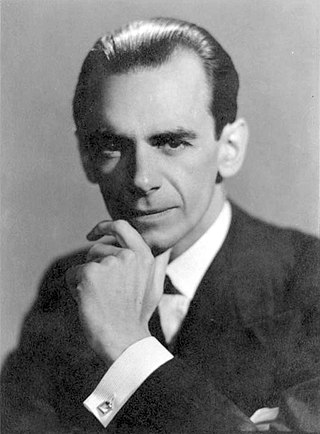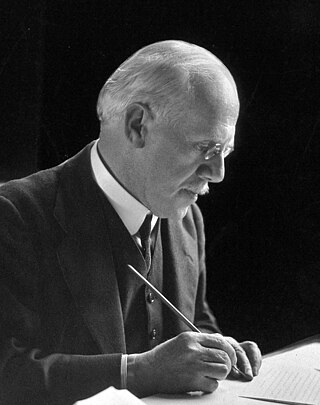Related Research Articles

Sir Harold Malcolm Watts Sargent was an English conductor, organist and composer widely regarded as Britain's leading conductor of choral works. The musical ensembles with which he was associated included the Ballets Russes, the Huddersfield Choral Society, the Royal Choral Society, the D'Oyly Carte Opera Company, and the London Philharmonic, Hallé, Liverpool Philharmonic, BBC Symphony and Royal Philharmonic orchestras. Sargent was held in high esteem by choirs and instrumental soloists, but because of his high standards and a statement that he made in a 1936 interview disputing musicians' rights to tenure, his relationship with orchestral players was often uneasy. Despite this, he was co-founder of the London Philharmonic, was the first conductor of the Liverpool Philharmonic as a full-time ensemble, and played an important part in saving the Royal Philharmonic Orchestra from disbandment in the 1960s.

Christopher Jarvis Haley Hogwood was an English conductor, harpsichordist, writer, and musicologist. Founder of the early music ensemble the Academy of Ancient Music, he was an authority on historically informed performance and a leading figure in the early music revival of the late 20th century.

Sir David Valentine Willcocks, was a British choral conductor, organist, composer and music administrator. He was particularly well known for his association with the Choir of King's College, Cambridge, which he directed from 1957 to 1974, making frequent broadcasts and recordings. Several of the descants and carol arrangements he wrote for the annual service of Nine Lessons and Carols were published in the series of books Carols for Choirs which he edited along with Reginald Jacques and John Rutter. He was also director of the Royal College of Music in London.

Keith Anderson Hope Murray, Baron Murray of Newhaven, KCB was a British academic and Rector of Lincoln College, Oxford.
Jonathan Freeman-Attwood, CBE is the 14th principal of the Royal Academy of Music in London; he was appointed in 2008. Alongside his commitment to education, he is a writer, record producer, broadcaster and musician.

The Gardiner Chair of Music at the University of Glasgow was founded in 1928 and endowed by the gift of William Guthrie Gardiner and Sir Frederick Crombie Gardiner, shipowners in Glasgow. The chair was previously a joint appointment with the directorship of the Scottish National Academy of Music, although this practice ceased on the retirement of Sir Ernest Bullock in 1952. The current professor is John Butt.

Sir George Newman was an English public health physician, Quaker, the first Chief Medical Officer to the Ministry of Health in England, and wrote a seminal treatise on the social problems causing infant mortality.

Sir David James Lumsden was a British musical educator, conservatoire-chief, conductor, choirmaster, organist and harpsichordist. After studying music at Cambridge he was a church organist, and later an academic. He was principal of the Royal Scottish Academy of Music and Drama in Glasgow from 1976 to 1982 and of the Royal Academy of Music in London from 1982 to 1993.
John Joseph Haldane is a British philosopher, commentator and broadcaster. He is a former papal adviser to the Vatican. He is credited with coining the term 'analytical Thomism' and is himself a Thomist in the analytic tradition. Haldane is associated with The Veritas Forum and is the current chair of the Royal Institute of Philosophy.

John Sebastian Bach Stopford, Baron Stopford of Fallowfield KBE FRCS FRCP FRS was a British peer, a physician and anatomist, and a Vice-Chancellor of the University of Manchester. Lord Stopford was described as "one of the greatest anatomists of this century".
David Alexander Syme Fergusson is a Scottish theologian and Presbyterian minister. Since 2021, he has been Regius Professor of Divinity at the University of Cambridge.

William Gillies Whittaker was an English composer, pedagogue, conductor, musicologist, Bach scholar, publisher and writer. He spent his life promoting music. The University of Durham, where he once studied and taught, called him one of "Britain's most influential musicians during the first half of the twentieth century". An autodidact, he was a prodigious creator of Gebrauchsmusik.

John Philip Kitchen MBE is a Scottish organist, harpsichordist, conductor, early music scholar, and music educator based in Edinburgh. He serves as the Edinburgh City Organist. Kitchen is known for his extensive recording portfolio of organ music, and his research and demonstration of historical keyboard instruments. He made major contributions to the discography and scholarship on the organ works of William Russell, and Johann Ludwig Krebs.
Douglas Maurice MacDowell, was a British classical scholar. His early career was as a teacher, first in the British Army as part of his national service and then at two private school. He then moved into academia and was a lecturer at the University of Manchester. Finally, for thirty years, he was Professor of Greek at the University of Glasgow.
Ivor Christopher Banfield Keys, CBE was a musicologist and academic.
Frances Elizabeth Moran, was an Irish barrister and legal scholar. She was Reid Professor of Criminal Law from 1925 to 1930, and Regius Professor of Laws from 1944 to 1963 at Trinity College, Dublin (TCD). She was called to the Irish Bar in 1924 and the English Bar in 1940. She was the first woman to become a law lecturer in Ireland and also to hold a chair at TCD when she was made Reid Professor. She became the first woman to take silk in Ireland, and indeed across the British Isles, when she was made a Senior Counsel in 1941.
William Rodolph Cornish was an Australian legal scholar and academic who was based in the United Kingdom. He was Herchel Smith Professor of Intellectual Property Law at the University of Cambridge from 1995 to 2004.
Peter Williams was an English musicologist, author, harpsichordist, organist, and professor. Williams was considered one of the leading scholars on the organ and the life and works of Johann Sebastian Bach.
Dennis William Harding,, known as D. W. Harding, is a British archaeologist and academic, specialising in the British Iron Age. Having taught at the University of Durham from 1966 to 1977, he was then Abercromby Professor of Archaeology at the University of Edinburgh from 1977 to 2007.
Angus Mcintosh, was a British linguist and academic, specialising in historical linguistics.